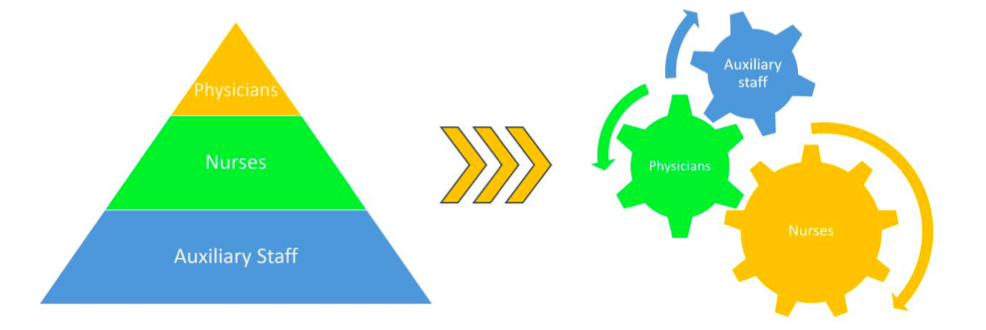In the past, nurses provided a service for patients. They were there for patients' basic needs; to give them a drink, to help them eat, to care about their bodily functions, to treat symptoms, monitor for fever, to care for them in their last hour of life and innumerable other things. As time went by, nurses started to learn a lot of new, more specialised things. They started to study and carry out more complicated and comprehensive tasks – care of wounds, taking blood tests, intravenous injections, intramuscular injections, infusions for hydration... so much more. And look at us now! We are studying hard, usually in tertiary education, to become nurses. We are studying side by side with the physicians. We know so much about the indications, contraindications, medications, examinations, infusion therapies, treatments, and so many other things. We have really grown into specialists in our field.
For a long time, we used to operate in the pyramid paternal model, as shown in the left side of the picture below. The physician, as a director, decides what is best for the patient without any contribution from nurses or patients. Nurses were only the hands of physicians and they followed without question the physician’s orders. Unfortunately, in some units this pyramid is still the truth. We are well-educated and capable. We prove it every single day with our hard work. So, why do we still sometimes have to advocate for our place in the multi-professional team? Why is the important voice of nurses still questioned in some places? Why do we still hear the sentence: “I don’t care about your opinion. You are just a nurse!”?

“Just a nurse”. Words, which resonate in the heads of all nurses who've heard them. That feeling that your opinion has no weight, that it means nothing, is disturbing. A recent survey about bullying shows that 87 per cent of nurses had encountered physicians who were reluctant or refused to answer nurses’ questions or return calls. 74% experienced physicians’ condescending or demeaning comments or insults. One nurse also commented that every single nurse she knows has been verbally attacked by a doctor. Every single one. Unfortunately, we often love our work, our team and so we don’t want to report anything. We are looking for a reason. Why are they acting like that and how can we manage it better to avoid this bullying situation? What did we do wrong that has put us in this situation? Where can this lead? This situation has only two effects: nurses’ burnout and an unsafe environment for patients. Is that really what we want in our workplace?
On the other hand, there are also some physicians, especially young ones, who have just left university with a fresh diploma in their hands, and they can be bullied by nurses. “What did he/she study at the medical school for such a long time? He/she knows nothing about treatment!” There are many lovely colleagues – physicians, who are completely supporting us. They hear our concerns about patients, they respect our opinion and give us the chance to show our contribution in ongoing treatment. Nurses should, in turn, support their physician colleagues. Having the added insight of the patients after spending hours caring for them provides invaluable information which needs to be shared between colleagues. As experts in oncology, nurses should support and teach the doctors newly entering the field and help to create a team that excels in its work and care of patients.
Physicians, nurses, physiotherapists, psychologists, and other health care workers: all of them, all of us, are important parts of the team. We are just like gears in the machine. If you want the machine to do what is expected, all those gears have to be synchronised and in order. If even one gear is broken, the whole machine is affected. If we would like to be like a good and functional machine, we have to cooperate. If we would like to cooperate, we have to communicate. Communication and partnership between nurses and physicians is essential. Physicians know what the best treatment is for the patients. However, nurses are beside the patients' beds 24 hours a day and 7 days a week. We have to be physicians' 'eyes and ears’, to provide them with often life-saving information about patients. We know the patients, we know their families, we know their habits.
Dear physicians, huge thanks to many of you, who give us the opportunity to grow. To those, who give us a chair at their table to be a real, respected partner in their, I mean in our, fight against cancer – we are here, ready to help and ready to be equal partners to you.